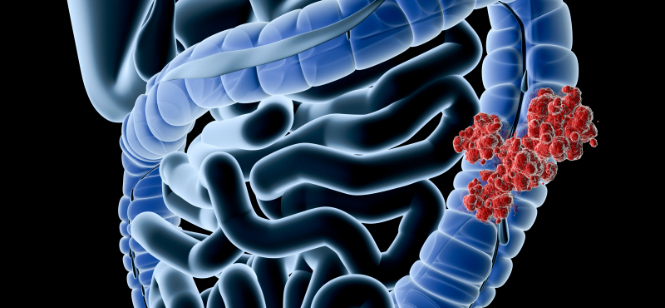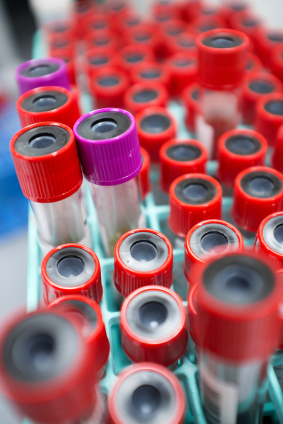Bowel cancer affects 1 in 12 Australians and is the second largest cause of cancer deaths in Australia.
We have been working in the area of colon cancer prevention and detection for some time, and the announcement this week of a major step towards a more effective and reliable blood-based test for bowel cancer is delivering on this major research effort.
The test is the result of a five-year scientific collaboration between CSIRO, Australian biotech company Clinical Genomics and Flinders University in Adelaide. Such a test has been the goal for many scientists working in molecular diagnostics around the world, and this development is a major step forward.
Australia has one of the highest rates of bowel cancer in the world. It’s the second most common type of cancer diagnosed in Australia and is Australia’s second biggest cancer killer after lung cancer. More than 14,000 Australians are told they have bowel cancer every year and 4,000 die from it every year.
If you find these figures hard to digest, Bowel Cancer Australia has developed an interactive cancer map to bring it all closer to home. It’s a bit macabre, but you can zoom in to find out exactly how many people in your suburb are struck down by bowel cancer.
Sampling blood, over the current test, may increase the rate of screening in Australia.
The fight against bowel cancer is so mainstream that even Lara Bingle has put her name behind an awareness campaign. Others are also working hard to raise awareness, with the Bowel Cancer Movement flash choir a notable attempt at raising public attention of the disease.
The good news is that bowel cancer is one of the most curable types of cancer if detected early, but fewer than 40% of bowel cancers are detected early. That’s why the team is so keen to find better ways to diagnose this cancer.
Working with our collaborators, we have now identified a two gene combination called ‘Gemini’ which can detect bowel cancer 76 per cent of the time with an accuracy of 93 per cent in normal patients. The two genes, BCAT1 and IKZF1, were discovered and validated in cancer tissue specimens before research moved to blood testing late last year.
While the initial study reported on a group of 251 patients, a larger study of more than 2,500 patients is now underway and will be complete in early 2013.
Our Dr Peter Molloy explains a bit about this research project and why it means so much to this team of researchers.
The current screening tool for bowel cancer in Australia is a FOBT (Faecal Occult Blood Test) which detects invisible blood in bowel movements, but Julien Wiggins, Bowel Cancer Australia’s chief executive, said another screening option for bowel cancer is an exciting development.
“We’d expect a routine blood test will appeal to many, providing a much-needed boost to participation rates for bowel cancer screening,” Mr Wiggins said.
He said the test could potentially save thousands of lives and improve five-year survival rates which languish at 66 per cent for bowel cancer. However, until a new blood based test is widely available, FOBT remains a proven, simple and effective screening tool for bowel cancer.
We have been researching colorectal cancer and gut health for a number of years to develop better diagnostics for colorectal cancer, investigate foods that are protective, and find ways to improve gut health. A while back, we even invented a colonoscopy simulator to help teach medical practitioners how to diagnose the disease more effectively.
If you’re really keen to get behind the push to promote public awareness of bowel cancer, you might like to consider joining the aptly named Bowel Movement.




8th November 2012 at 9:56 am
Is there a way I can participate in a trial? My father’s first bowel cancer was before age 55, my mother’s terminal multiple secondary cancers started with bowel cancer.
8th November 2012 at 4:27 pm
Hi Vicki
Thanks for your question and interest.
Recruitment for the trial is being conducted by one of our partners, Flinders University, through colonoscopy clinics in the Southern Adelaide region. From what we understand, participants are recruited from patients presenting for colonoscopy as a part of their normal care program for clinical gastrointestinal symptoms, rather than via recruitment of symptom free volunteers.
So, unfortunately, we are unable to assist you at this stage.
7th November 2012 at 5:38 pm
PS: I note that one chart is “incidence” and another mortality …
7th November 2012 at 1:40 pm
Hi
according to http://www.aneki.com/colon_cancer_countries.html
we are not in the top ten … I think you’re new test is great news, and having had my wife just die of a brain tumor I wish there was more simple testing (such as blood based tests) for screening cancers.
I simply wished to question the levels.
7th November 2012 at 3:56 pm
Hi Chris
Thanks for your question. The source of information on the link that you provided is the International Agency for Research on Cancer, which is part of the World Health Organisation (WHO).
WHO run the Globocan project, which provides estimates of the incidence, mortality and prevalence of major cancers. Their database on colorectal cancer actually shows that Australia and New Zealand have some of the highest incidence rates worldwide (2008): http://globocan.iarc.fr/factsheets/cancers/colorectal.asp
The data in the first figure are the ones on which the ranking is based. This does link together countries geographically so Australia and NZ are lumped together, as are some countries of SE Asia and Europe. Individual country rates may vary from the pooled statistic, but the take home message is still that the incidence rate of colorectal cancer in Australia is one of the highest in the world.
7th November 2012 at 5:05 pm
Hello
thanks for providing that link and the information. Its interesting to see how variant the two sources are. Interestingly the link I provided claims its source to be ” International Agency for Research on Cancer” but does not provide additional identification of data source.
I found it interesting as my Family in Finland seem to be under the apprehension that Finland has higher incidence per person … so I assumed it was perhaps something like national-centrism (as one *wants* to score high on such a chart).
7th November 2012 at 1:21 pm
Early 2013 is the end of the larger trial. When will the blood test become available for mainline use?
8th November 2012 at 5:09 pm
Hi Bob
Our apologies for the delayed response.
The test is currently being developed by a diagnostics firm in the United States, they hope to make it available for clinical use in the US sometime later next year.
Our research partner, Clinical Genomics, are also seeking expressions of interest from diagnostics firms in Australia. Hopefully, they will be able to make an announcement on the development of the test in local markets in the near future.
7th November 2012 at 1:11 pm
I would like to record an interview on this subject for West Gippsland Community Radio. Would you please pout me in touch with someone willing to do a telephone interview?
7th November 2012 at 1:52 pm
Hi Lynne, we’re sourcing a spokesperson for you and will contact you direclty to make arrangements. Thanks for your interest.